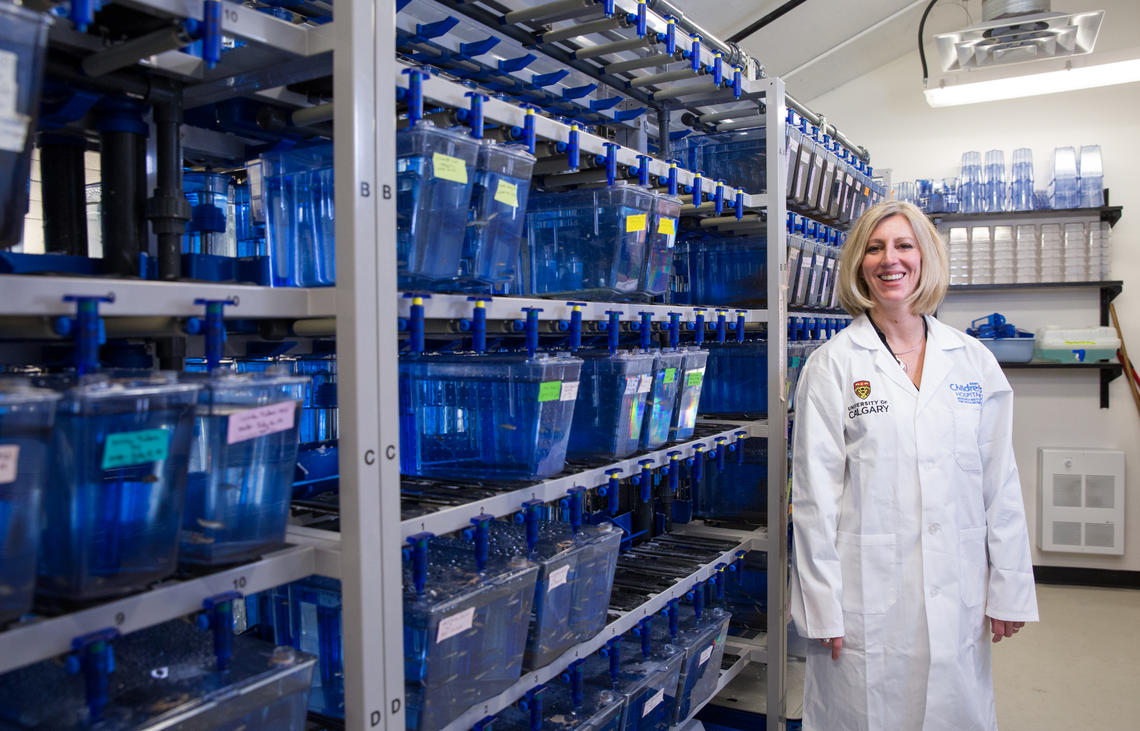Kurrasch Lab Research Published: BPA exposure during development alters brain function and behavior in female mice
Recent research published in Proceedings of the National Academy of Sciences has provided significant insights into the impact of bisphenol A (BPA), a common industrial chemical, on brain development and behaviour, in mice. Read more >>
Kurrasch lab research featured on CTV News Calgary
T. Boone Pickens' posthumous donation to fund 'organoid' research among other Hotchkiss Brain Institute programs read more >>
Research study ‘feels like hope’ for Calgary family
UCalgary researchers use new approach in precision medicine to screen anti-seizure drugs for child read more >>
Dr. Deepika Dogra, postdoc in the Kurrasch lab, wins People's Choice award in Research Slam
Third annual Research Slam shows off range and impact of postdoctoral research read more >>

Dr. Deborah Kurrasch honoured with Outstanding Woman in Innovation award
Four UCalgary researchers honoured for excellence in biomechanics, epilepsy and carbon capture read more>>

Goodbye party for Professor Rosin
We will miss you Jessia! Good luck setting up your lab at UBC! Visit her lab website here
Study shows BPA exposure below regulatory levels can impact development of the brain's sleep centre
Research in mice adds to body of data on harms of Bisphenol A, a chemical commonly found in plastics. Read more >>

Dinu Nesan, first author, left, and Deborah Kurrasch, principal investigator.
Riley Brandt, University of Calgary
UCalgary researchers discover link between prenatal stress and altered brain development
Neuroimmune cells respond to prenatal stress and adversely affect males more than females. Read more >>

Deborah Kurrasch and Jessica Rosin.
Riley Brandt, University of Calgary
HBI trainees heading to Bordeaux, France this spring as instructors for neurocampus workshop
Jessica Rosin from Kurrasch lab & other outstanding trainees were recently accepted as instructors in the Université de Bordeaux Neurocampus Workshop .Read more >>
UCalgary scholars share expertise with French colleagues on parasite protection, stress transmission, and why we eat
Research fund grant builds bridges for collaborations on brain and mental health research read more >>
Research Links BPA Exposure to Circadian Rhythm Changes
ENDO 2019
Researchers at the University of Calgary found that exposure to bisphenol A (BPA) during pregnancy can lead to changes in circadian rhythms and an increase in hyperactivity, according to a mice study reported at ENDO 2019 on Sunday.
BPA exposure during pregnancy can alter circadian rhythms
ENDO 2019 NEWS CONFERENCE
Researchers advise pregnant women to limit exposure to receipts and plastic
The receipts can contain the toxin bisphenol A and its chemical cousin bisphenol S, chemicals that a new study shows can alter brain development and behaviour in animals exposed to extremely low doses. Read more >>
Margaret Munro
Cumming researchers develop new method to discover drugs to treat epilepsy
Investigating the effectiveness of the ketogenic diet led researchers at the Cumming School of Medicine to develop a new drug screening method to discover drugs to treat epilepsy.

From left: Pediatric neurologist Dr. Jong Rho, postdoctoral fellow and the study's first author Kingsley Ibhazehiebo, and neuroscientist Deborah Kurrasch.
Photos by Riley Brandt, University of Calgary
Research involving zebrafish could lead to new treatments for epilepsy
Research at the Alberta Children’s Hospital Research Institute is showing great promise in treating childhood epilepsy. Zebrafish genome is 80 per cent the same as humans and this outside-the-box thinking could lead to the first new treatment for epilepsy in decades.
University of Calgary's Cumming School of Medicine
Research profiled in NPR WHYY The Pulse
Research using zebrafish in the lab in hopes of speeding up the drug discovery process was featured in a nationally syndicated piece in NPR WHYY The Pulse Read more >>
Zebrafish study shows bisphenols affect embryonic brain development
Researchers find low levels of chemicals linked to hyperactivity in exposed fish . Read more >>
Kurrasch lab featured in Tech Times
Study Warns BPA-free Label Does Not Mean You're Safe from Toxic Materials: What You Should Know , Read more >>
What's the real cost of cheap food? Nutrition, children, and the factors that shape our eating habits
A growing body of research suggests the amount of processed foods we eat is doing a great deal of harm, and that the more ingrained our eating habits get, the harder they are to change. Read more >>



